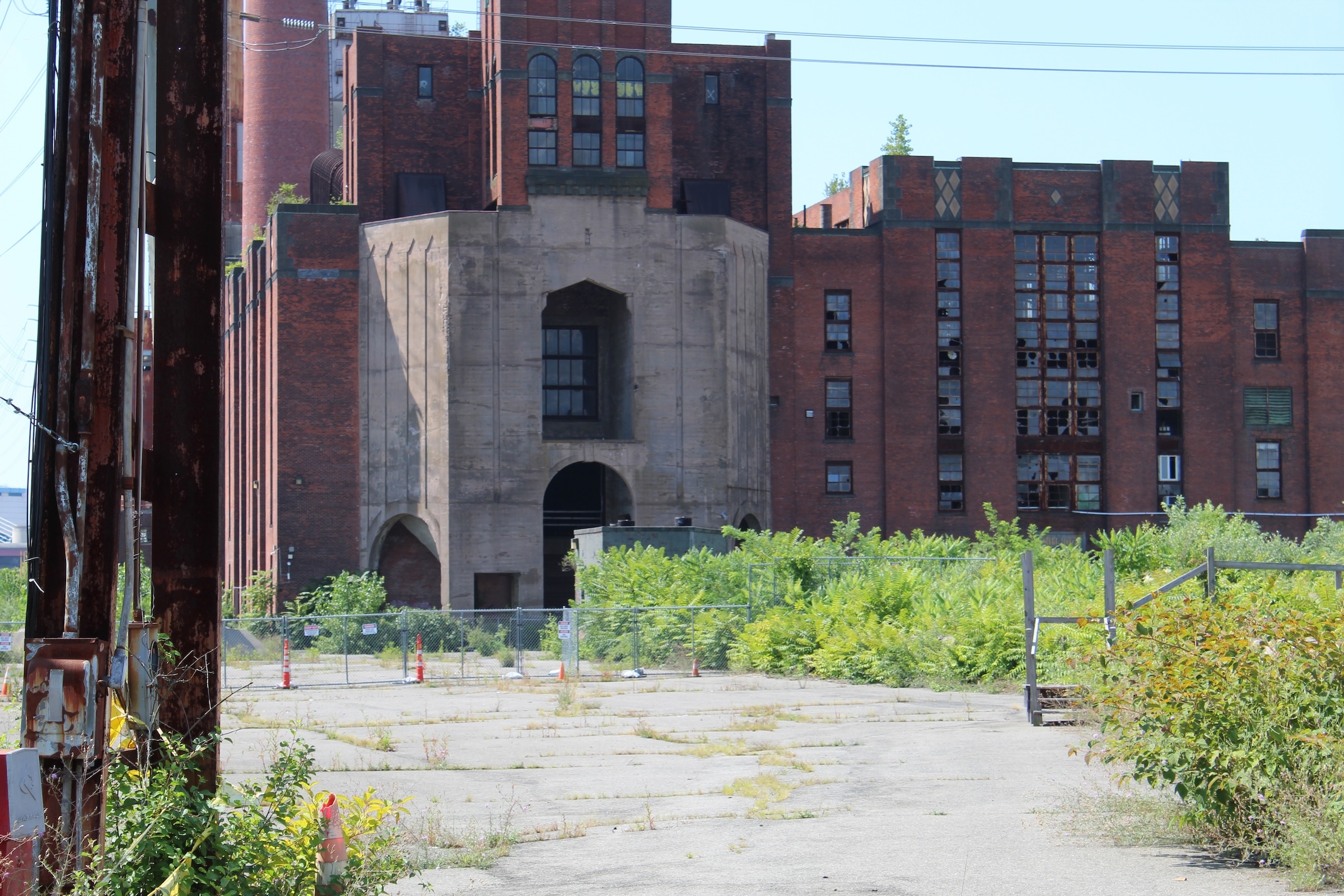
MONA MAHADEVAN photo
City sights set on turning English Station …

contributed photos
… into "Mill River Park."
The Elicker administration has taken another step towards trying to open a waterfront park at the highly contaminated, privately owned site of the former English Station power plant: petitioning the Board of Alders to rezone the property into a Park District.
In a letter dated July 29, Economic Development Administrator Mike Piscitelli proposed changing 510 Grand Ave.’s zoning designation from Heavy Industrial Zone to Park District.
“Rezoning is an important first step toward public ownership and redevelopment of the site, aligning with the City’s Vision 2025 planning goals and advancing equitable access to high-quality green space and climate-resilient coastal environment,” wrote Piscitelli.
The rezoning proposal was written a day after Mayor Justin Elicker held a press conference announcing the city’s plans to build “Mill River Park,” an ambitious project that would turn the blighted 8.6‑acre site into a public green space with walking and biking trails, native plant gardens, and the city’s first outdoor pool.
According to the Zoning Ordinance, Park Districts are intended to “set aside and protect areas that are publicly or semi-publicly owned and are designated as public parks and open spaces.” Rezoning would align with that use, wrote Piscitelli, by supporting “public recreation, environmental restoration, and equitable community activation” on 510 Grand Ave.
The rezoning proposal is listed as a communication on the agenda for Monday night’s full Board of Alders meeting. The item next must head to an aldermanic committee for review before returning to the full board for a potential final vote.
What would rezoning mean for the property’s owners, Paramount View Millennium, LLC and Haven Properties, LLC?
Elicker told the Independent on Monday that if there’s an existing use for the property, the owner can continue that use, even if the new zone does not allow it.
“We want it to be a park, so we’re starting the process of changing it to a park district so that we can move the process along,” he said, “as we hopefully work to negotiate an appropriate sale price for the property.”
Elicker said the city still needs to negotiate a purchase price with the current owners, who have not yet responded to the city’s letters of interest, and secure approval for the sale from the Board of Alders.
Court Order Raises Demolition Prospect
The rezoning proposal comes just days after Connecticut Superior Court Judge John B. Farley ordered the state Department of Energy and Environmental Protection (DEEP) to continue deliberating on its dispute with United Illuminating (UI) over the cleanup of English Station.
UI operated the property as a coal and oil-fired power plant from 1929 to 1992, leaving behind high levels of carcinogens, polychlorinated biphenyls (PCBs), heavy metals, and other contaminants. Since UI sold the site to Quinnipiac Energy in 2000, it has passed through a series of multiple owners.
In 2016, UI struck a Partial Consent Order with DEEP, in exchange for the agency clearing the way for the company’s $3 billion acquisition by Spanish energy giant Iberdrola SA.
Under the agreement, UI committed to putting at least $30 million over three years into site remediation.
Nine years later, only $22 million has been spent on clean-up, with just $17 million counting towards the $30 million obligation.
Remediation has been stalled, according to UI, because the state changed the deal’s terms.
“In 2016, the Connecticut Attorney General and the Commissioner of DEEP negotiated and reached an agreement with UI that the company would spend $30 million to remediate English Station and was not required to demolish the site. They now want to change the deal,” a UI press release from January 2024 states.
Four months later, DEEP issued a declaratory ruling interpreting the 2016 PCO as requiring remediation of PCBs inside the English Station buildings down to a concentration of one part per million — a standard UI argues effectively mandates demolition.
UI appealed the decision, arguing that the one-part-per-million threshold applies only to “PCB remediation waste,” defined in the Code of Federal Regulations as waste caused by “a spill, release, or other unauthorized disposal.” Under that interpretation, building materials (e.g., caulk, paint, insulation) with PCB concentrations below 50 parts per million would require no remediation.
The distinction matters: “The record suggests that requiring the application of the ≤1 ppm standard to the entire building is tantamount to requiring demolition of the plant,” Judge Farley wrote in his decision last week.
A UI spokesperson told the Independent that demolition would cost over $60 million, more than double what the company expected to spend in 2016.
Due to ambiguity in the standard set by the PCO agreement, Farley remanded deliberations back to DEEP.
“What compromise the parties struck and what they achieved by using the language they agreed upon is not clear,” he wrote. “Thus, despite the parties’ mutual determination that the PCO is clear and unambiguous on this subject, in each case favoring their own mutually exclusive interpretations of the language, the court concludes that the PCO is ambiguous on this issue.”
According to Farley, DEEP will now need to consider “extrinsic evidence…bearing on the question of intent”: in particular, whether both parties understood the deal to rule out demolition.
Meanwhile, UI is appealing a decision of the New Britain Superior Court, which upheld a penalty of $2 million per year for its failure to complete remediation.
In a separate case, Attorney General William Tong sued UI for failing to spend $30 million on remediation. Farley has already shot down four out of five of UI’s special defenses in a separate decision.
As those legal battles drag on, the city is moving forward with its plans for the park.
As of now, the city believes Farley’s decision will not impact the park’s opening date, tentatively set for sometime in 2030.